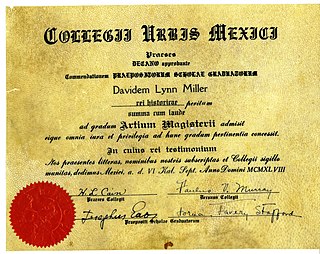
A Juris Doctor, Doctor of Jurisprudence, or Doctor of Law (JD) is a graduate-entry professional degree that primarily prepares individuals to practice law. In the United States, it is the only qualifying law degree, while other jurisdictions, such as Australia, Canada, and Hong Kong, offer both the postgraduate JD degree as well as the undergraduate LL.B., BCL, or other qualifying law degree depending on the requirements of the jurisdiction where the person will practice law.

Postgraduate education, graduate education, or graduate school consists of academic or professional degrees, certificates, diplomas, or other qualifications usually pursued by post-secondary students who have earned an undergraduate (bachelor's) degree.

A Bachelor of Arts is a bachelor's degree awarded for an undergraduate program in the liberal arts, or, in some cases, other disciplines. A Bachelor of Arts degree course is generally completed in three or four years, depending on the country and institution.
An academic degree is a qualification awarded to a student upon successful completion of a course of study in higher education, usually at a college or university. These institutions often offer degrees at various levels, usually divided into undergraduate and postgraduate degrees. The most common undergraduate degree is the bachelor's degree, although some educational systems offer lower-level undergraduate degrees such as associate and foundation degrees. Common postgraduate degrees include engineer's degrees, master's degrees and doctorates.
A bachelor's degree or baccalaureate is an undergraduate degree awarded by colleges and universities upon completion of a course of study lasting three to six years. The two most common bachelor's degrees are the Bachelor of Arts (BA) and the Bachelor of Science. In some institutions and educational systems, certain bachelor's degrees can only be taken as graduate or postgraduate educations after a first degree has been completed, although more commonly the successful completion of a bachelor's degree is a prerequisite for further courses such as a master's or a doctorate.
A doctorate or doctoral degree is a postgraduate academic degree awarded by universities and some other educational institutions, derived from the ancient formalism licentia docendi.

Undergraduate education is education conducted after secondary education and before postgraduate education, usually in a college or university. It typically includes all postsecondary programs up to the level of a bachelor's degree. For example, in the United States, a student pursuing an associate or bachelor's degree is known as an undergraduate student while a student pursuing a master's or doctoral degree is a graduate student. Upon completion of courses and other requirements of an undergraduate program, the student would earn the corresponding degree. In some other educational systems, undergraduate education is postsecondary education up to and including the level of a master's degree; this is the case for some science courses in Britain and some medicine courses in Europe.

A Master of Science is a master's degree. In contrast to the Master of Arts degree, the Master of Science degree is typically granted for studies in sciences, engineering and medicine and is usually for programs that are more focused on scientific and mathematical subjects; however, different universities have different conventions and may also offer the degree for fields typically considered within the humanities and social sciences. While it ultimately depends upon the specific program, earning a Master of Science degree typically includes writing a thesis.

Social class in the United States refers to the idea of grouping Americans by some measure of social status, typically by economic status. However, it could also refer to social status and/or location. The idea that American society can be divided into social classes is disputed, and there are many competing class systems.

A diploma is a document awarded by an educational institution testifying the recipient has graduated by successfully completing their courses of studies. Historically, it has also referred to a charter or official document of diplomacy.
The Master of Social Work (MSW) is a master's degree in the field of social work. It is a professional degree with specializations compared to Bachelor of Social Work (BSW). MSW promotes macro-, mezzo- and micro-aspects of professional social work practice, whereas the BSW focuses more on direct social work practices in community, hospitals and other fields of social services. In some countries, such as Australia, the United Kingdom and Hong Kong SAR, some MSW degrees are considered equivalent to BSW qualifications as a qualifying degree.
The Carnegie Classification of Institutions of Higher Education, or simply the Carnegie Classification, is a framework for classifying colleges and universities in the United States. It was created in 1970 by the Carnegie Foundation for the Advancement of Teaching. It is managed by the American Council on Education.

A licentiate is an academic degree present in many countries, representing different educational levels. It may be similar to a master's degree when issued by pontifical universities and other universities in Europe, Latin America, and Syria.

The Australian Qualifications Framework (AQF) specifies the standards for educational qualifications in Australia. It is administered nationally by the Australian Government's Department of Industry, with oversight from the States and Territories, through the Standing Council of Tertiary Education Skills and Employment. While the AQF specifies the standards, education and training organisations are authorised by accrediting authorities to issue a qualification.
An undergraduate degree is a colloquial term for an academic degree earned by a person who has completed undergraduate courses. In the United States, it is usually offered at an institution of higher education, such as a college or university. The most common type of these undergraduate degrees are associate degree and bachelor's degree. Bachelor's degree typically takes at least three or four years to complete. In some other educational systems, undergraduate education is post-secondary education up to the level of a master's degree; this is the case for some science courses in Britain and some long-cycle medicine courses in other European countries. These degrees can be categorised as basic or first professional degrees.

A vocational university or university of applied sciences (UAS), less commonly called a polytechnic university is an institution of higher education and increasingly research that provides applied professional education and grants academic degrees. It should not be confused with vocational schools or technical schools that do not meet the strict standards of higher education nor have the ability to grant officially accredited academic degrees.

The educational attainment of the U.S. population refers to the highest level of education completed. The educational attainment of the U.S. population is similar to that of many other industrialized countries with the vast majority of the population having completed secondary education and a rising number of college graduates that outnumber high school dropouts. As a whole, the population of the United States is spending more years in formal educational programs. As with income, levels differ by race, age, household configuration, and geography.
A professional degree, formerly known in the US as a first professional degree, is a degree that prepares someone to work in a particular profession, practice, or industry sector often meeting the academic requirements for licensure or accreditation. Professional degrees may be either graduate or undergraduate entry, depending on the profession concerned and the country, and may be classified as bachelor's, master's, or doctoral degrees. For a variety of reasons, professional degrees may bear the name of a different level of qualification from their classification in qualifications, e.g., some UK professional degrees are named bachelor's but are at master's level, while some Australian and Canadian professional degrees have the name "doctor" but are classified as master's or bachelor's degrees.
The terms average Joe, ordinary Joe, regular Joe, Joe Sixpack, Joe Lunchbucket, Joe Snuffy, Joe Blow, Joe Schmoe, and ordinary Jane, average Jane, and plain Jane, are used primarily in North America to refer to a completely average person, typically an average American. It can be used both to give the image of a hypothetical "completely average person" or to describe an existing person. Parallel terms in other languages for local equivalents exist worldwide.











